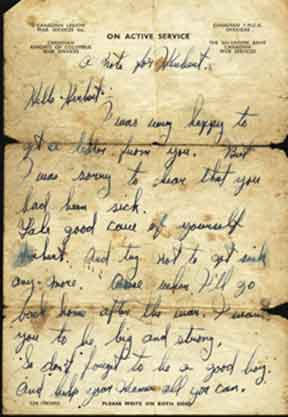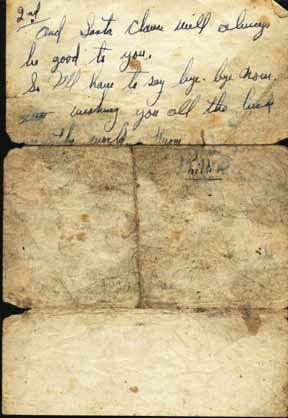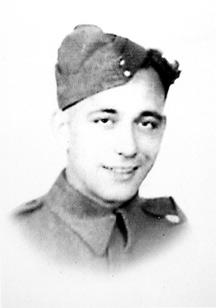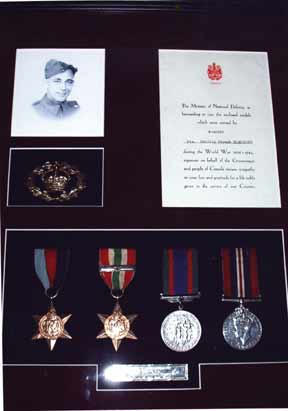Wartime Heritage
ASSOCIATION
A Note to Herbert
Phillip Blanchard (West Nova Scotia Regiment)
Phillip Blanchard was born in 1921 in Spring Haven, Nova Scotia. The son of Albanie and Ester
Blanchard, Phillip’s mother died before the outbreak of World War II. His father remarried a widow,
Julienne Muise, who had two sons, and two daughters. Phillip had three brothers Raymond, Ambroise,
and Nelson, and three sisters Celeste, Loretta, and Janet. His two half-brothers were Louis Muise and
Jean Baptiste Muise.
Five members of the combined family would serve their country during World War II. Phillip
enlisted in the Army in 1939, as did his brother Raymond. Two years later his brother Ambroise also
enlisted and joined the Royal Canadian Air Force. In May 1942, their youngest brother Nelson enlisted
in the Army. His half-brothers were also in the military. Louis served in the Royal Canadian Air Force
and Jean served in the Royal Canadian Army.
Following basic training and service in Canada, Phillip was assigned to the 3rd Infantry Brigade,
West Nova Scotia Regiment and was part of the allied advance through Italy. As was common with
most young servicemen, letters were written home. Sometime in the fall of 1943, Phillip wrote a letter home and enclosed a note to
Herbert his godson who, at that time, was about five or six years of age.
The letter reads as follows: “A note for Herbert"
"Hello Herbert
I was very happy to get a letter from you. But I was sorry to hear that you had
been sick. Take good care of yourself Herbert and try not to get sick any more. Cause
when I’ll go back home after the war. I want you to be big and strong. So don’t forget to
be a good boy and help your mama all you can. And Santa Clause will always be good to
you. So I’ll have to say bye, bye now wishing you all the luck in the world.
From Phillip”
Herbert would never see Phillip again. West Nova Scotia Regiment participated in
some of the fiercest fighting of the Italian campaign at Cassino in the Liri Vally, during the
early months of 1944. The Canadians had broken through the German lines. It was on the
May 24th, 1944, at the age of 23, that Phillip was killed in action.
A memorial service was held for both Phillip Blanchard and a fellow soldier, John
Edward Doucette, from Quinan, Yarmouth County, Nova Scotia, a village near Springhaven.
Two crosses were erected for them in the cemetery at St. Agnes Roman Catholic Church,
and two empty coffins were lowered into the plots on that day.
Both Phillip Blanchard and John Edward Doucette are buried in the Cassino War
Cemetery, 139 kilometers from Rome. Phillip's grave is Plot 13 Row F Grave #18.
The telegram advising that Phillip had been killed in action was delivered to his
uncle Eugene and aunt Charlotte's home. When Phillip's aunt heard the news, she became
physically ill and was sick for two days after receiving the news. It would be Phillip’s
uncle, Eugene, who would tell Phillip’s cousins that he had been killed. Because they were
little children they couldn't understand why their mother was so upset. It was the first
time they had ever really seen their mother cry and become sick.
The older members of the family, Phillip’s sisters and brothers, remember stories of
his time at home and often mention that he was a very good singer and a guitar player.
His uncle tells the story of his departure and going with him to the train station to see
him, off. The uncle had purchased a pint of rum for Phillip, a little something to have
during the journey. But, not wanting to make anyone aware of this, he attempted to slip it
into Phillip’s pocket as the soldiers were ready to board the train. Thinking he had
successful slipped the pint into the pocket unknown to others, he let go of the bottle. The
pint fell to the ground and smashed! No special treat for Phillip on the train!
Raymond Blanchard had also enlisted in September of 1939 on the same day as
Phillip. He was posted to Aldershot in Nova Scotia and then to England, assigned as a
Sergeant Major to troop training. The two brothers managed to see each other while in
England. Encountering one another, Phillip addressed his brother with “hey Raymond".
Phillip was, at the time, with an officer from his company. The officer was quite dismayed
that someone would address a Sergeant Major in such a manner. Phillip was disciplined for
addressing his brother in such an informal way. Army rules applied.
Near the end of the war, Raymond requested a posting on the continent and was able
to visit Phillip's grave in Italy.
As for Herbert, he had safely kept the note from Phillip in a small box with his things.
When he left home the box was left with his mother and today remains among the
memories of a young Phillip Blanchard. Phillip’s four medals are in a special case together
with a letter from the Minister of National Defense carefully kept by Phillip’s brother,
Nelson.




Phillip Blanchard
Page 1 - The Note To Herbert
Page 2 - The Note To Herbert
Memories of Phillip Blanchard


copyright © Wartime Heritage Association
Website hosting courtesy of Register.com - a web.com company
A Note to Herbert
Private Phillip Blanchard


- World War I - Menu
- WWI Stories and Articles
- Photos - Yarmouth Soldiers
- Selection of World War I Songs
- WWI Casualties of Yarmouth, NS
- Those Who Served - Yarmouth, NS
- WWI Casualties Digby Co. NS
- WWI Casualties Shelburne Co. NS
- Merchant Mariners (1915) Yarmouth, NS
- Canadian Forestry Corps - Non Yarmouth Birth/Residence Enlistments
- US Draft Registry - Yarmouth NS Born


- World War II - Menu
- WWII Stories and Articles
- Telegraphist Air Gunners
- WWII Casualties of Nova Scotia
- US Casualties with NS Connection
- Far East/Pacific Casualties with NS Connection
- Merchant Navy Casualties Nova Scotia
- Nova Scotia WWII Casualties Holten Canadian War Cemetery
- D-Day Casualties - Nova Scotia
- CANLOAN Program Casualties - Nova Scotia
- Battle of the Bulge Casualties - Nova Scotia
- WWII Casualties Yarmouth NS
- Yarmouth Casualties - RCAF RAF Canadian Army WWII
- Yarmouth Co., Marrages WWII
- Casualties Non-Born/Residents with Connection to Yarmouth Co., Nova Scotia.
- WWII Casualties Digby Co., NS
- Non-Nova Scotian WWII Casualties Buried in Nova Scotia
- WWII RCAF Casualties Aged 16-18
- Brothers/Sisters Who Served - World War II













